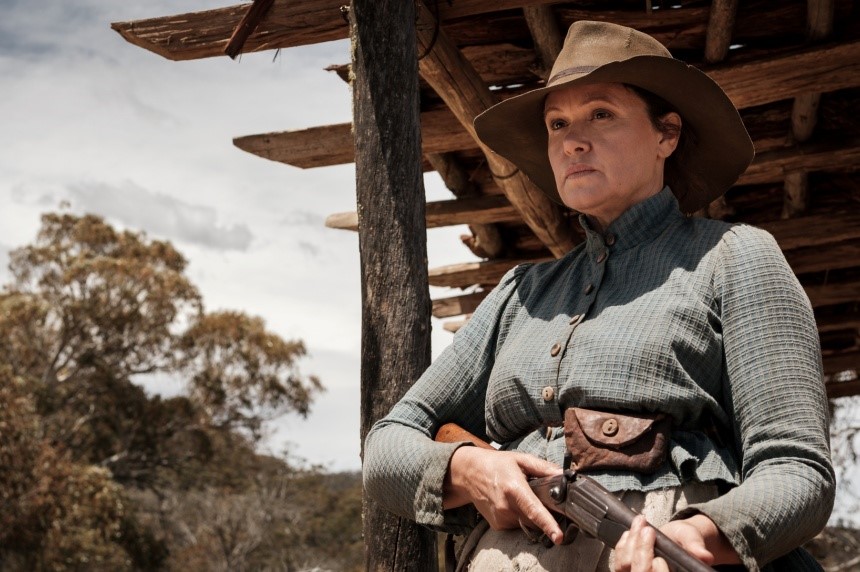The Legend of Molly Johnson
⭐️ ⭐️ ⭐️⭐️
Run Time: 1 hour 49 minutes
Stars: Leah Purcell, Rob Collins, Sam Reid, Jessica De Gouw
Writer/Director: Leah Purcell
In Theaters and Video on Demand
I’m frankly a little ticked off at the good people in Australia, who have apparently for decades been keeping the astonishingly talented actor/director/writer Leah Purcell all to themselves.
Purcell is the force of nature behind The Legend of Molly Johnson, a powerful Aussie “Western” set in the Outback of the 1890s. Besides writing and directing, Purcell stars as the title character, a tough-as-a-dingo frontier woman, the wife of a sheep drover.
We meet Molly while her hubby is, as far as anyone knows, off in the hills, gone for the season, doing his droving thing. She is obsessively sweeping the dirt outside her barely-there shack of a home, keeping one eye on her five children (that’s a rough count; I frankly couldn’t keep track of ’em all) and the other eye on the innumerable lethal dangers that lurk behind every scraggly tree.
Molly is also really, really pregnant, but that doesn’t slow her down one bit when she snatches her shotgun and, with one well-placed shot, brings down a wild bullock threatening the kids. She’s equally threatening to an intruder: an Aboriginal drifter named Yadaka, an escaped slave on the run from the authorities.
“I’ll shoot you where you stand and I’ll bury you where you fall,” she barks, and he has no reason to doubt her.
At first, Molly and Yadaka, played with mesmerizing understatement by Rob Collins, seem to have little in common. But as the narrative pushes on through the dusty, dry Australian summer, it becomes tragically clear that in the Outback women and slaves pretty much share a rung on the regional social ladder. Both are considered little more than necessary commodities, and for either group, one step out of line can have fatal consequences.
Yadaka hides out on Molly’s spread — doing odd jobs, becoming something of a surrogate dad to Molly’s oldest boy — despite the fact that every lawman in the area is after him in connection with a series of murders. We’re never quite clear on whether or not Yadaka is guilty of the crimes; he seems entirely too sweet-natured to have done such things. But in the social hellscape proffered by The Legend of Molly Johnson, good people are too often compelled to desperate action, and said action not infrequently results in a bullet to someone’s head.
Into this harsh, unforgiving world ride two outsiders from London: British Army Sgt. Nate Klintoff (Sam Reid) and his defiantly progressive wife Louisa (Jessica De Gouw). He’s just trying to do his job bringing some sort of law and order to the region; she is publishing political/social tracts stridently advocating for women’s rights. Needless to say, neither one is particularly welcome here.
After a chance encounter with Molly, Nate becomes concerned about her safety out there in the bush (He’s obviously never seen her wield a shotgun). He sends a subordinate to check on her welfare — a gesture that goes south almost immediately, proving once more it’s best to let sleeping dogs lie and frontier women sweep their dirt.
Purcell, herself part Aboriginal Australian, has been a staple on Australian TV for more than 30 years, reaping top awards for performances on series including Wentworth and Fallen Angels. Here, Purcell doesn’t just play Molly Johnson, she inhabits the character, and with good reason: She knows Molly better than anyone. In 2016 Purcell wrote and starred in an award-winning play, The Drover’s Wife, based on an 1892 short story about an unnamed pioneer woman. In 2019, Purcell published a best-selling novel that, for the first time, gave the character a proper name: Molly Johnson.
Now, with a film version of the story, Molly would seem to have come full circle. That is, unless Purcell has a rock opera up her sleeve. I’d be up for that, too.
Become a Saturday Evening Post member and enjoy unlimited access. Subscribe now




Comments
The difference is that aborigines came at no cost to the land owner (grabber). A slave at least had to be paid for.
Re the Legend of Molly Johnson. The aborigine Yadaka would have been a suspected felon not a slave. While the natives were treated like slaves he would not necessarily have been called one.